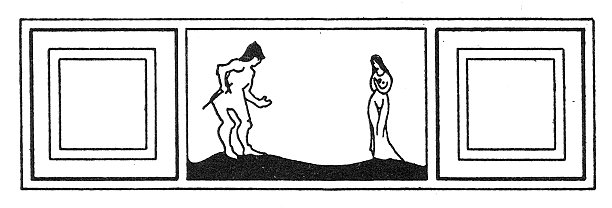
|
BEHOLD here another work of Ovid, who was born in the moist land of the Peligni, of Ovid who singeth to the world of his own follies. This time, again, ’twas Love that willed it. Hence! Avaunt! ye prim and prudish ones. No fitting audience, ye, to strains that sing of tender love. I would be read of none save the maiden that grows warm when she beholds her lover, and of the boy till now unvisited by Love. I pray, too, that some young man, wounded by an arrow sped from the same bow that hath stricken me, may recognise in my verse the image of the flames whereby he is consumed. Long may he marvel, and then at last exclaim, "How comes it that this poet singeth the very story of my love? Who is it hath informed him?" I was, I remember, making bold to sing of the Wars of Heaven and Gyges of the hundred hands, and verily I was well equipped for that great argument. I was about to sin the fell revenge of Tellus and the fall of Pelion with Ossa crashing down from high Olympus whereon they were empiled. In my hands I held the clouds, Jove and his thunderbolts, wherewith he would not have failed to defend his heavenly realms. And then my mistress slammed her door against me. Forthwith I dropped Jupiter and his lightnings; aye, Jupiter himself clean vanished from my mind. Forgive me, Jupiter thy weapons were of no avail to me. That close-shut door moved me more than all thy thunderbolts. Back to my love songs and my gentle elegies went I; those are the arms for me, and ere long my gentle plaint moved to compassion the unfeeling doors. Poetry hath power to bring the blood-red moon to earth; poetry stayeth in mid-career the snow-white coursers of the sun. Poetry robbeth the serpent of his poisoned fang, and maketh the rivers to flow backward to their sources. Poetry hath battered down doors, it hath forced back locks, how tight soever they were welded to the massy oak. What had it booted me to sing Achilles fleet of foot; what would the sons of Atreus have done for me, or he who waged fierce war for ten long years and then wandered ten more upon his homeward way; or hapless Hector, dragged by the Hæmonian steeds across the dusty plain? But as soon as ever I pipe the praises of a sweet young girl, she cometh in person to pay the singer for his song. And that, methinks, is no small recompense. So farewell, ye heroes with illustrious names; not yours to bestow, the favours that I crave. But as for you, my charmers, look sweetly on the songs which rosy Cupid singeth in mine ear. |
|
Hoc quoque conposui Paelignis natus aquosis, |